#real talk what even is white american culture
Text
IMAGE DESCRIPTION ADDED. REBLOG THIS VERSION AND THANK YOU @lab-labrava FOR WRITING IT!
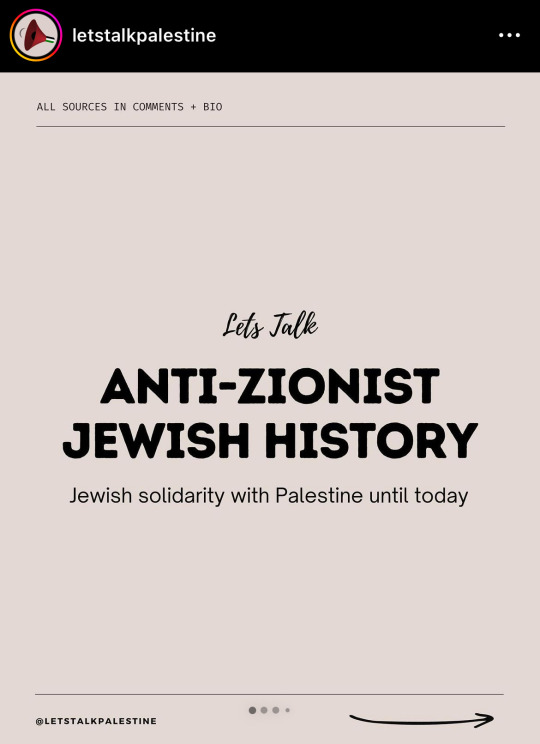
ID: An infographic from the Instagram account @letstalkpalestine consisting of 10 slides.
Image 1: The title page of the infographic. The text says: "Let's talk Anti-Zionist Jewish History." A smaller subtitle underneath the title says: "Jewish solidarity with Palestine until today." End ID.
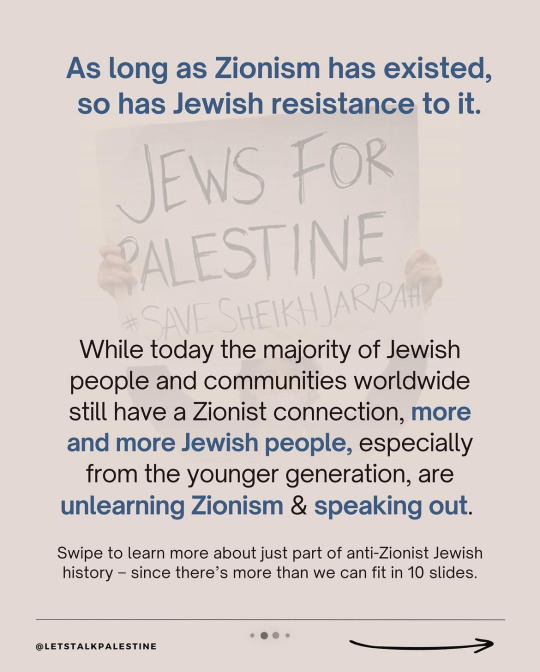
Image 2: The infographic continues to the next panel. The text says, "As long as Zionism has existed, so has Jewish resistance to it. While today the majority of Jewish people and communities worldwide still have a Zionist connection, more and more Jewish people, especially from the younger generation, are unlearning Zionism & speaking out. Swipe to learn more about just part of anti-Zionist Jewish history - since there's more than we can fit in 10 slides." A semi-transparent image is overlayed in the background, of someone holding up a sign that reads: Jews for Palestine! #Free Sheik Jarrah. End ID.
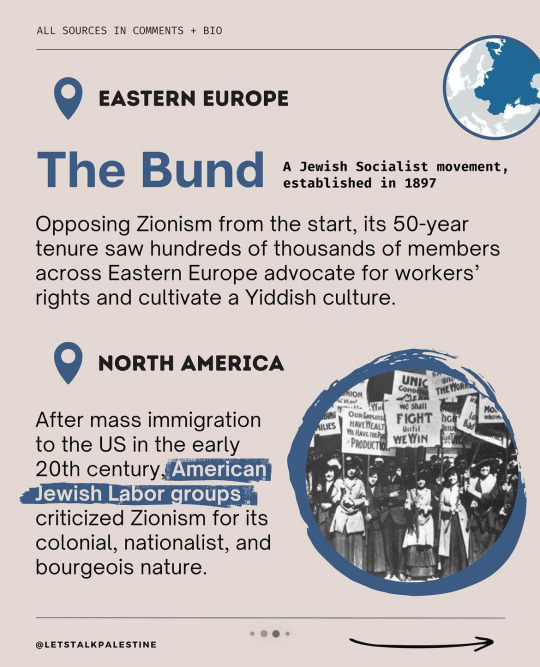
Image 3: Icon of a location tag next to the words Eastern Europe. In large, blue text is the word "The Bund" and the subtitle describing what it is, "A Jewish Socialist movement, established in 1987."
The following paragraph says, "Opposing Zionism from the start, its 50-year tenure saw hundred of thousands of members across Eastern Europe advocate for workers' rights and cultivate a Yiddish culture."
Location tag and the title, "North America." The paragraph says, "After mass immigration to the US in the early 20th century, [American Jewish Labor groups] (highlighted in chalky blue and bold white text) criticized Zionism for its colonial, nationalist, and bourgeois nature." Next to this text, is a circle with women protestors holding up signs. End ID.
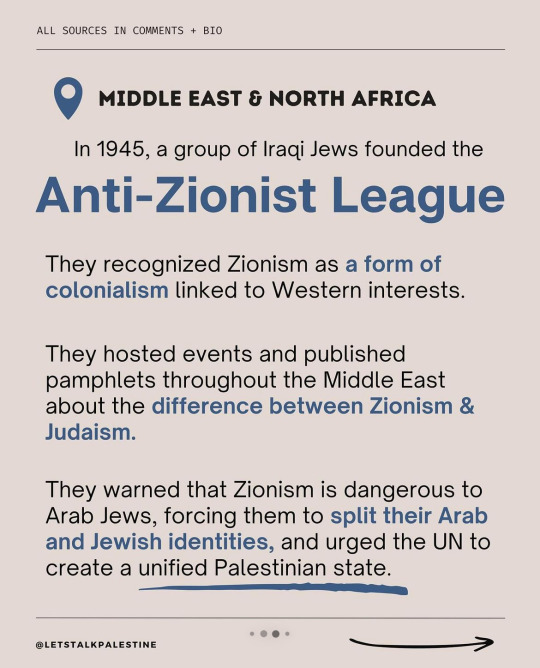
Image 4: The title, "Middle East and North Africa." The paragraph states, "In 1945 a group of Iraqi Jews founded the Anti-Zionist League. They recognized Zionism as a form of colonialism linked to Western Interests.
They hosted events and published pamphlets throughout the Middle East about the difference between Zionism & Judaism.
They warned that Zionism is dangerous to Arab Jews, forcing them to split their Arab and Jewish identities, and urged the UN to create a unified Palestinian state.
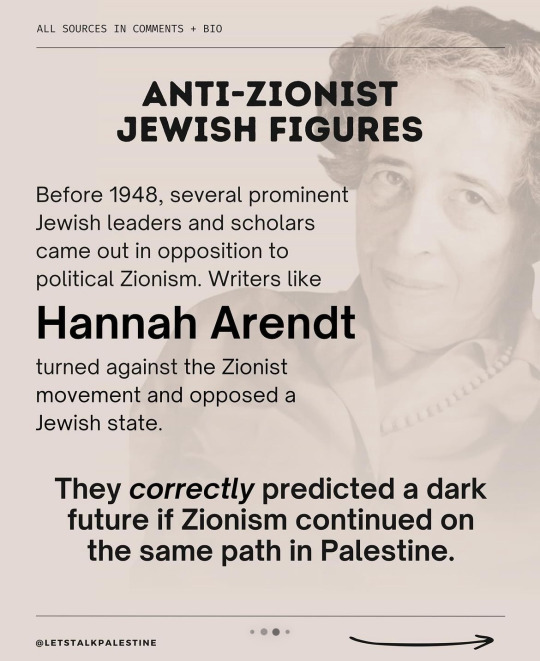
Image 5: The panel is titled, "Anti-Zionist Jewish figures." A faded image of Hannah Arendt's visage is in the background. Overlayed on top, the following paragraphs discuss her. "Before 1948, several prominent Jewish leaders and scholars came out in opposition to political Zionism. Writers like Hannah Arendt turned against the Zionist movement and opposed a Jewish state.
They correctly predicted a dark future if Zionism continued on the same path in Palestine. End ID.
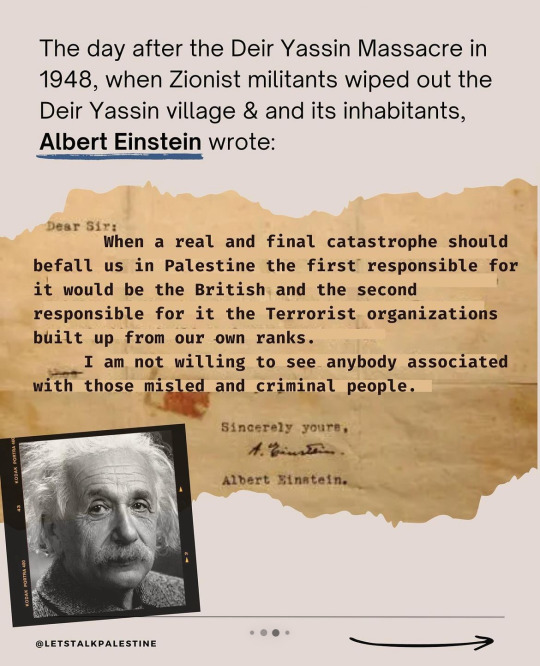
Image 6: The day after the Deir Yassin Massacre in 1948, when Zionist militants wiped out the Deir Yassin village & its inhabitants, Albert Einstein wrote:
"When a real and final catastrophe should befall us in Palestine the first responsible for it would be the British and the second responsible for it the Terrorist organizations built up from our own ranks. I am not willing to see anybody associated with those misled and criminal people." The former paragraphs are imposed against a tan, parchment fragment, in typewriter font, and the letter ends with Sincerely yourn, Albert Einstein, both his signature and typed name. End ID.
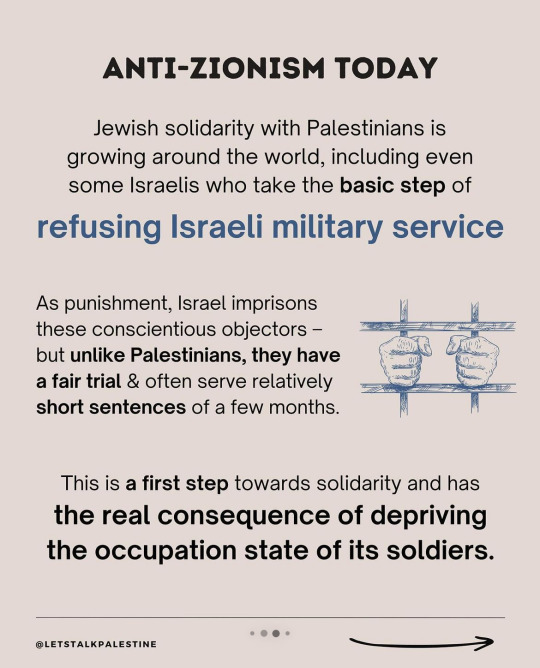
Image 7: Titled "Anti Zionism Today." Blue sketchy image of someone's hand gripping jail bars breaks up the following paragraphs which say: Jewish solidarity with Palestinians is growing around the world, including even some Israelis who take the basic step of refusing Israeli military service.
As punishment, Israel imprisons these conscientious objectors — but unlike Palestininas, they have a fair trial & often severe relatively short sentences of a few months .
This is a first step towards solidarity and has the real consequence of depriving the occupation state of its soldiers. End ID.

Image 8: Titled "Israel's Crackdown on Jewish Anti-Zionism" Behind this text are a picture of handcuffs. In the corner is a picture of Jonathan Pollak. The following text says: Jonathan Pollak is a Jewish Israeli and long-time anti-Zionist activist. Israel has detained him several times, most recetly in January as he protested with Palestinians in Beita, (a Palestinian village) for allegedly throwing stones.
Jonathan has been violently attacked for his activism. In 2018, Jonathan was slashed across the face by settlers who ambushed him outside his workplace. Earlier, in 2005, Israeli soldiers shot a tear gas canister. directly at him, causing internal bleeding in his brain." End ID.
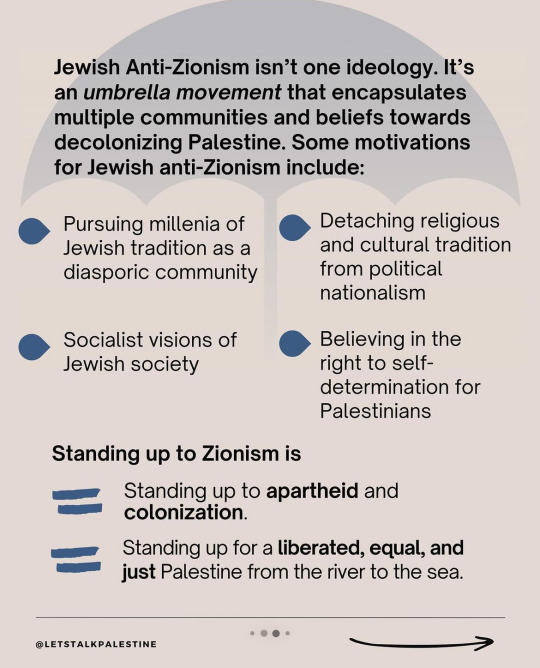
Image 9: Semi-transparent image of an umbrella behind the title text is "Jewish Anti-Zionism isn’t one ideology. It’s an umbrella movement that encapsulates multiple communities and beliefs towards decolonizing Palestine. Some motivations or Jewish anti-Zionism include:
1. Pursuing millenia of Jewish tradition as a diasporic community
2, Detachibng religious and cultural tradition from political nationalism.
3. Socialist visions of a Jewish Society.
4. Believing in the right to self-determination for Palestinians
Standing up to Zionism is:
1. Standing up to apartheid and colonization.
2. Standing up for a liberated, equal, and just Palestine from the river to the sea.
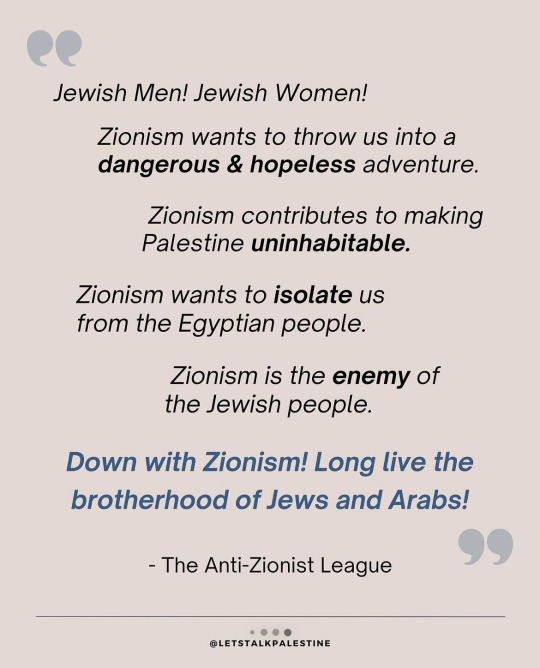
Image 10: An ending quote, and call to action, by the Anti-Zionist League. It says: "Jewish Men! Jewish Women! Zionism wants to throw us into a dangerous & hopeless adventure. Zionism contributes to making Palestine uninhabitable. Zionism wants to isolate us from the Egyptian people. Zionism is the enemy of the Jewish people. Down with Zionism! Long live the brotherhood of Jews and Arabs!" --The Anti-Zionist League. End ID.
#israel#jewish#jews#jumblr#palestine#resources#history#resistance#genocide#instagram#ethnic cleansing#activism#zionism#anti zionism#socialism#colonialism#colonization#judaism#free palestine
1K notes
·
View notes
Text
on the one hand I do understand where people are coming from when they respond to The White American Desire For Authentic Culture by going "you already have a culture" and pointing out that this desire often has reactionary undertones
that being said, I think it's largely sidestepping the actual issue, which is that American culture fucking blows chunks. American culture is strip malls and military worship and the elevation of mass-market pablum to Bold Artistic Statements.
and subculture is only partially an escape from this, because most subcultures exist within the same constraints of American culture as a whole; they are captured and redefined by capital on such a frequent basis that it often feels impossible to hold onto them in any meaningful way.
moreover, even the parts of American culture that aren't complete garbage are more or less inextricable from the colonial, imperialist, and racially-stratified history of the country. like, I think of that post that went around a while ago talking about "America sucks but has some good parts," and one of the things it listed was national parks, and people (rightfully!) pointed out that the national park system is fundamentally flawed and tends to shit on indigenous nations by design.
the only thing I can think of that's even sort of an exception is pop culture - jazz and rock music, superhero comics, Hollywood. and all of those are, again, captured and defined by capital, and in one way or another have historically been built on screwing over the artist.
so we come to a position, one way or another, where a lot of people say something like: "I'm alienated. I'm surrounded by traditions and institutions I think are shit; I have no way to meaningfully undermine them, and I can't escape them without effectively destroying my life. the culture I was born into is a gravestone on top of another gravestone, lifeless and miserable, and people are constantly shouting that I should be grateful because it's The Greatest Country In The World."
at that point, one seeks an escape, and I think there are three major routes here.
one is to become a weird lib obsessed with the Real Soul Of America. America is really about the good parts, not the bad parts which outnumber them and which they are built upon.
another is to fixate on the Exotic, for lack of a better word. cultures which you do not have an obvious "connection" to, but which fascinate you or appeal to you. obviously this can be pretty fucking fraught, though I would argue that taking an interest in other cultures is a good thing if you aren't shitty about it. (That's its own conversation.)
the third is to fixate on the culture(s) you feel you "ought to have" had, that which was sacrificed on the altar of whiteness by grandparents or great-grandparents who, frankly, had different concerns. to look at a culture that may still be defined in many ways by cruelty and stratification - the way I would argue most human civilization has been - but that seems to have had something else going on, at least. a culture that may not have been recognizable 500 years ago, but at least it existed.
again, none of these impulses is beyond criticism, and I think it would be naive to say that the last one can't have reactionary undertones. I also doubt these impulses are unique to the USA! alienation is extremely common in today's world, and it's not as though the USA is the only settler state in existence.
what I am saying is more that I think the conditions that lead to these fixations are worth paying attention to, and that dismissing them with "you already have a culture" kind of misses the point in favor of getting in a zinger. people wouldn't want a different culture if they were happy with the one they had. like so many other things, people want one that Doesn't Completely Suck. failing that, they'd probably like to not be defined by any culture at all - but that, tragically, is just as impossible.
#related to the post i just rb'd obviously#idk. i don't know how Developed these thoughts are but they're bouncing around in my brain
788 notes
·
View notes
Text
Hundreds of neo-nazis, including members of the current far-right Italian government, gathered for a ceremony outside Italy’s former neo-nazi party headquarters. They chanted white suprematist slogans, displayed white suprematist symbols, and lined up in army formation for a collective nazi salute.

The video source here is Twitter. Because despite the fact that multiple Italian politicians have confirmed it’s real, I could only find two “news” articles covering the event, from Vice and The Guardian, of all places. Both refer primarily back to this video. I hate to be the bitch who says “Why isn’t anybody talking about this,” but in this case, the “this” that isn’t getting talked about is the resurrection of the same European fascist regime that led to the literal fucking Holocaust. So I’m not going to ask, “Why isn’t anybody talking about this?” Instead, I’ll say this, and I’ll say it specifically to the Jews:
Western goyim had the chance to stop this from happening. They had the chance to show that they had grown from the Shoah, from Shoah denialism, and from rampant, centuries-old antisemitism. They had the chance to speak out for us, to protect us, and to give real meaning to the words “Never Again”. Instead, they have at best paid hollow lip service to Jewish safety, and they have enabled the globalization of the ripe conditions of nazism we find ourselves in today. We know why no one is talking about this. We know.
There are less Jews today then there were in 1939. We lost six million lives less than a century ago, within living memory. We have not recovered from that loss. But the world has forgotten. Ten percent of Americans under 40 have never even heard of the Shoah. The majority don’t know how many lives we lost. The statistics from Europe aren’t that much better.
They say that those who have forgotten their history are doomed to repeat it. Goyim have forgotten, and the repetition is here. We’ve seen them repeat thousand-year-old canards without batting an eye. We’ve seen them call for the gassing, ethnic cleansing, and genocide of Jews. We’ve seen the lengths they will go to supporting misinformation about our history and culture, in service of the people who call us dirty pigs and dogs who need to be hunted to extermination.
I am horrified that I haven’t seen international news outlets or goyim on social media talk about this yet. I am angered by it. But I am not surprised. Whatever crimes against Judaism come next, I will be horrified, and I will be angered. But I will no longer be surprised by what they will stoop to.
528 notes
·
View notes
Note
Hi Jay. Not wanting to sound mean, but I really think it must be commented and that there's no softer way of doing that: the company's statement of Thunder Junction being an inhabitated plane prior to MoM is not a honest way of capitalizing on a sellable trope without touching its uncomfortable issues. It's even disrespectful. They have done it in a less flagrant way with Kaladesh and both Ixalan iterations, but now they've gotten too far with Thunder Junction. Colonialism is too big an issue to simply being put under the carpet as it never existed and we could just enjoy the sunny part of the history. I really hope Hasbro as a company acknowledges this and changes its way of dealing with the theme. Thanks for letting me pointing this.
Look, you caught me on a bad day, so I'm going to be as polite as possible but let's start with the foundation that this is not a complaint to direct at me. I have no control over any of this. Mark Rosewater exists and takes feedback on Tumblr.
But, let's talk about it, because I've seen some folks take this to extremes.
First off, I've seen a lot of well meaning folks speaking up on behalf of hypothetical indigenous americans, but I'd love to get takes from folks this actually impacts. I'd love for Wizards to post something about their work with cultural consultants, for sure. But the only actual thing I've seen so far is a great story from Magic's first indigenous american author. And when you're speaking on someone else's behalf, you tend to miss things. Like, Kaladesh is not the great representation of south asian culture that you might think when you jumped to it, and it's okay if you didn't know that, but it sort of proves the point that it's very difficult to actually protest on someone else's behalf. And I just haven't heard from anyone who has also mentioned they speak from authority or are impacted by this. That doesn't mean you're wrong, necessarily.
But here's the thing. Thunder Junction isn't history. It takes cues from the American West, sure, but it's a fake world. And sometimes it's okay for a fake world to ignore the bad things that happens in real life and create something more aspirational. Magic does this all the time. Magic doesn't have homophobia, but that isn't really realistic or representative of the real world, is it?
No one, and I mean literally no one, came to me and said that people of color needed to be ostracized and not allowed to work alongside the white people in the demon mob families of New Capenna. That racism was real, it was systemic, and it was violent. But did it need to be tackled in a fantasy crime drama based on america in the 20s? Should it have been? I don't think anyone would have enjoyed it as much. Sometimes it's just fun to play gangster.
Similarly, the colonization and manifest destiny that was the reality of the American West was tragic, but does that need to be our only depiction of indigenous peoples - being colonized? If they were erased completely from the narrative, that would be awful, but can't they just have fun being cool thunder slingers? The Atiin were developed with a consultant, and if you want answers ask Wizards to talk about it.
There's a reason the Oltec were depicted as being sealed off from the Immortal Sun drama that had happened on the surface. To have an aspirational mesoamerican culture that wasn't affected by the Dusk Legion and Azor and all that.
To put it in another perspective, does every period piece featuring black americans need to feature systemic racism to be respectful? Is Bridgerton disrespectful (I mean probably but not for that reason)?
The reason I've framed a lot of this as questions is because I don't necessarily think I know the right answer, especially not for a fantasy card game. I've worked with tribal governments in my emergency management career and spent a week on the Navajo Nation, and talked a lot about perspective on things, and I would not presume to know what the right answer to all of this is.
Edit: to be clear, Could it have been handled better? Probably. I will never deny that. But also it’s a complicated and fraught topic and I’d love to hear from the people wizards contracted who actually know what they’re talking about.
192 notes
·
View notes
Text
The horse is six feet under at this point I know but I still can't get over the gall of James Somerton correctly! arguing that Disney's lack of queer representation should be blamed solely on the company and not on the Chinese market, only to immediately fuck up any sort of logic he had in saying that by concluding that this is because China should be completely written off as a viable market because the government only lets people watch shows about communism and censors everything else 🤪 source: I shit you not, a right wing conspiracy theorist !! Since he doesn't actually know anything about the subject he's talking about, he's not actually making any arguments. He only mentions Chinese BL because the article he plagiarized did, and even then he has to punctuate it with a "audience of mostly STRAIGHT WOMEN! " of course, even though the article also acknowledges and has multiple interviews with queer Asian people who found comfort in the genre right below all the stuff he copied. There's no mention of queer Chinese artists or lesbian works or any sort of empowerment, probably because he didn't care to learn about any of them, and so rather than ending with what could have been a strong message about the persistence of queer identity even under political oppression, the video fizzles out into nothing with an aftertaste of "so Disney should just say fuck the Chinese and make whatever they want" (because yeah James sure that's the reason why Disney doesn't make gay stuff there's definitely no biases within the company itself or American culture) and "well at least we still have the Japanese and the Thai are making bl now!" Just the epitome of self-centered white saviorism. No real sympathy or respect for queer Asian struggles, just a reframing of a unique struggle with representation into "well I got mine so go get yours somewhere else" while he waits for them to spit out a work that he can regurgitate into a profit on his channel
#also he pronounced weibo as weebo#horrible. straight to the electric chair for that guy#james somerton
260 notes
·
View notes
Text
ok ok slightly feral post as promised.
first, some context setting: I think it's really interesting to analyse texts in terms of both what the author was trying to do (and whether they succeeded) and what they ended up doing (intentionally or not) and I think their cultural/historical context is vital if you want to do this. I'm not interested in whether Robert Jordan or the Wheel of Time are, like, morally correct in their politics or whatever. I'm interested in what the art is trying to do.
and the thing about Jordan, see, is that he projected this image during his lifetime of a Genial Older Man (see: beard and pipe) but he...wasn't actually that old! He was 42 when EoTW was published. He died at 58. He was a Baby Boomer publishing books at a time when Baby Boomers were the hip young generation taking over from stodgy WWII veterans (Gen Z: It Will Happen To You Too).
What this means is that he was a child and adolescent during the Civil Rights movement, in a then-majority Black city in the Jim Crow South*. He would have gone to segregated schools. The tertiary institutions he attended had only started to desegregate a year or two before he attended each of them. I think his war trauma in Vietnam gets a lot of attention because he did talk about it and also because that's a narrative we understand for white men, but I think we...skim over the impact on white men of growing up at this time because? Civil Rights only happened to Black Americans I guess? but it's his context too. Similarly, he was an adolescent and young man at the time the (white) feminist movement was really kicking off in the US. he was in his mid-20s when banks were first legally *required* to allow women to open accounts and have credit cards in their own names. he went on to marry a woman a decade older than him, who had left her husband to raise her son as a single mother while continuing a professional career in the early 70s; these were issues that must have been incredibly relevant for her.
and what we see in his writing is attempts to grapple with gender and race that are self-evidently of mixed success, but I think have to be contextualised in light of this period of immense change he grew up in. Think about the predominance of women as merchants and bankers in WoT, in the context of how recent their rights to even control their own money were in the US. The...everything...he was trying to do with the Seanchan, making them extra-canonically Southern American-coded. The Whitecloaks as the KKK (among other things, of course).
As an example, I think there's also something probably unintentional but fascinating in the way he presents the pre-Breaking Aiel: bluntly, they are a distinct ethnic group in hereditary servitude (always thinking about how that ancestor of Rand's in the Rhuidean sequence had to get permission from Mierin Sedai to switch to someone else's service so he could marry his girlfriend, this is...uh...super cognate to issues enslaved Black people faced). They're associated with agriculture through the Song sequence. And they're pretty much the ideal of what slave-owning Southern American culture WANTED enslaved Black people to be: completely happy to serve. Then, as the post-breaking Aiel, they become feared as a source of violence, which resonates with the way that enslaved people were feared by their slavers.
I don't think for a second that the intention here was to depict the AoL as a Secret Slavery Dystopia, I think we're meant to take the Rhuidean flashback sections pretty much as they read on the page. But I also think putting Jordan in his historical and cultural context does pose the comparison. Similarly, I find it really interesting that he positions Seanchan as riven by constant revolts and uprisings (because it's a fascist slaver regime) but he never ever goes so far as to link enslaved people in Seanchan (damane and da'covale) to those revolts and uprisings, even though that is fundamentally the deep fear *for real and obvious reasons* of all slavery-based societies.
Or then there's the changes to the Two Rivers in the books - like, both then and now I think it's actually pretty radical to present an influx of Muslim-coded refugees of colour as a thing that enriches the Two Rivers both socially and economically. Various characters are wistful that it's changed, but they don't think it's bad. The text here is really clear that welcoming the Domani and Almoth Plain refugees is both morally right and beneficial. And this is in a book being written and published shortly after the first Gulf War.
There's so many more things like this where I just have no real idea what he was trying to do on purpose and what was accidental and what was fun for him in fiction but did not necessarily link at all to his real-world political beliefs. but gosh it's interesting to turn over and poke at.
#wheel of time#wot book spoilers#robert jordan#and then there's things like...IIRC some stuff about Gareth Bryne is referencing General Lee#and I know a lot of you are Bryne haters but the point here is not#that that means Bryne is bad#it's: how hard was RJ thinking about that and why did he do it at all?
279 notes
·
View notes
Text
The way in which people on this site and others unironically with not a shred of self reflection, will say things like "I'm America's biggest hater until a Brit starts speaking!" Like, they understand intrinsically what it's like for an outsider to make blanket judgments about the only culture they've ever lived in and ever known and they immediately decide that their feelings about that are true and valid.
And the response is not even "Well you're one to talk about our problems!" or "Um sweaty things here are far more complex than you understand so maybe leave the criticism to Americans," it's usually just "Rah rah bald eagle screeching go America fourth of July beans on toast OI BRUV!" or some other equivalent mockery of a European (or Canadian/Australian) stereotype.
Even if this is just silly joking, they are performing jingoistic nationalism at the slightest prickling of other Western (usually white) people daring to criticize America, even when it's accurate or in good faith. These Europeans (et al.) aren't even calling for the destruction of America, declaring Americans a dirty evil people who deserve nothing but pain and suffering and any calls to wipe them out are justified and any resistance to that is oppressive. They're just making fun of American aphorisms and the response is unquestioned patriotism. And no other super woke Leftie Americans look at this behavior and say "That's actually problematic." They're in on it.
But these same people couldn't possibly conceive of applying this thought process to an Israeli. That's just a non-starter to them. Like there are based Israelis on this site who are patriotic, who make dank memes and all, that much is true. But I'd say for the average Jew (Israeli or not) to react with extreme jingoism at the gentlest ribbing is just unthinkable. They know the optics of that. But Americans can throw a tantrum about being called out as the hegemonic power in the world and expect everyone to think that's actually really funny and cool.
An American can make jokes about "discovering oil" (the subtext being invasion and devastation) when someone from another country says "Wow Americans don't have electric kettles," but an Israeli can't even politely say "I don't think we all deserve to die because our Prime Minister is a corrupt racist shithead." No that's propaganda and genocide apologia. American privilege is real, I think.
81 notes
·
View notes
Note
i’m sorry that because of one person’s horrible actions you (and others in the space) feel they have to justify themselves and who they are. it’s grossly unfair and i can’t imagine how it must feel for you. i hope it’s a reassurance that we trust you and believe in you and support you. sendings hugs your way, i know this must be such a difficult day 🫂
Thank you.You know, when this came out, I didn't even think that someone would accuse me of lying, and it was actually a friend who warned it might happen. I said I wasn't worried; the idea sounded nonsensical to me.
I don't use Mexicanness as a marketing tactic in either myself or my books particularly. I'm actually pretty critical of "Mexico" in my fiction; my short story Midnight Invitation is about a mestizo guy sleeping with a white settler, and The River Boy is a pre-Colombian story. I have a lot of love for my culture, but I also critique it. I was actually interviewed last year on "latin fantasy" but I refused to shared the completed article because they cut out what I insisted they keep in: I think most of the popular "Latine fantasy" books have an huge indigenous appropriation problem.
I have a small suspicion that the main person who attacked me was Taylor trying to "take me down with them" because they know I don't want to show my face, but I've shown my face to other author colleagues and more importantly I think I have ways to "prove" I'm Mexican that aren't my actual body or skin-deep (ha) references to Dia de Muertos or Chocolate abuelita, how Taylor/Freydis attempted to do on their old race-faking account:
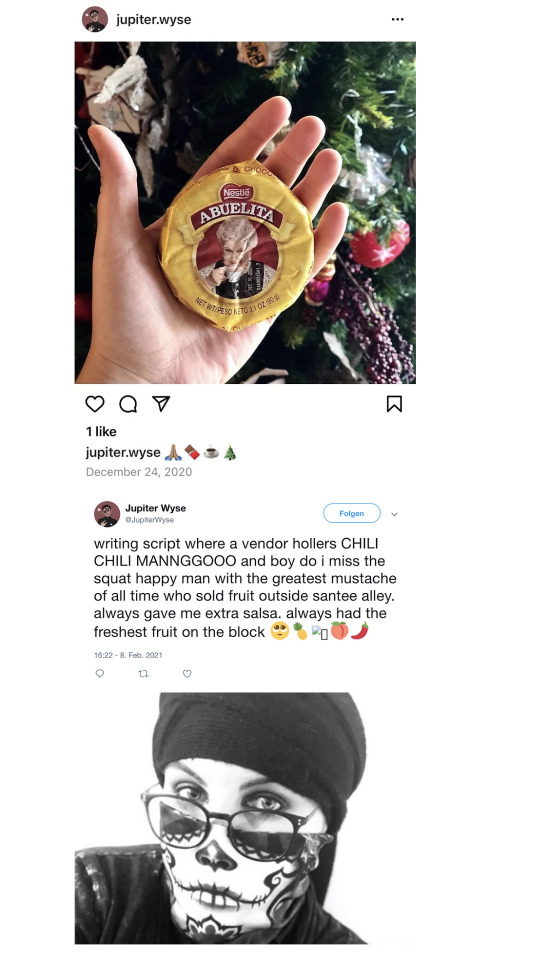
I have a tie to a specific place in Mexico with a specific culture within a specific time, with a specific language even. And culture isn't that vague aesthetic anglo-white people believe you partake in sometimes, it tends to come with real, constant material conditions.
And I can talk about those conditions just fine; I can talk about what Felipe Calderon's failure of militarization in Mexico, and I can talk about the issue of Mexican-American ICE recruitment in Mex-Am enclaves along the southern border. I can talk about very specific experiences of being told "Ta-ta-ta-tamaulipas!" by the border patrol. So on and so on.
I'm sorry for this essay, but I keep seeing "how does this keep happening that the industry boosts a race-faker more than the actual racially-ethnically marginalized people?" It's because the industry (I'm including the wider white book community here) only want the aesthetic of diversity. They want a white experience and white understanding in a racialized trenchcoat and that's exactly what a racefaker is.
It's been difficult to learn that a friend turned out to be a complete monster and liar, but I'll survive this and laugh about it in time as long as Taylor doesn't bother me again. And if Taylor is reading this, I don't hate you. I just feel very sorry that you're spending your life doing this. Please don't bother me or anyone else again
#im sorry for all the essays yall#last one i promise#mine#ask#freydis moon#but thank you so so much#really thank you
64 notes
·
View notes
Note
Hi Sophie! In light of the genocide in Palestine and the conspiracies around it, do you have any thoughts on how to avoid conspiracy thought?
You pointed out in Conspiracy on the Left that conspiracists will often switch from using language that recognizes incentives and structures, to language that indicates direct malice and intent. I've seen this in real time with Zionism where people will stop using it as a term to describe the ideology and actions of Israel and America (economic and military interests, the historical inertia of the british empire, the interest of capital and western nations using Israel as a base in the Middle East), to using it as a placeholder for jews (people accusing individual people (usually american) of attempting to silence voices with media platforms)
I was gonna say I find this one really straightforward, but at the same time I myself have actually rushed into condemnations of Israel that gave too much leniency to antisemitic ideas, so there probably is a bit more to it. I'll get to it
Firstly, the straightforward part of it is that there are jews all around the world who absolutely fucking despise israel and its genocidal project, so even saying "Israel doesn't represent jews" is too mild. Israel actively denies citizenship to ethiopian jews for instance. I think the main thing is to recognise it for what it is - an outpost of imperialist white supremacy in the Middle East - and to recognise Zionism as a primarily American and imperial core phenomenon rather than a jewish one.
Once you have those ideas down it's pretty easy to separate it out because assuming that any jewish person or org supports Israel just because they're jewish is clearly antisemitic.
But here's the rub, Israel uses jewish identity as a shield to justify its actions. At the same time that there are illegal settlers literally giving interviews saying "I describe myself as a fascist" the Israeli state claims that Hamas reads Mein Kampf and that Palestinians are literal Nazis. Not only that but Israeli statesmen use references to things like Amalek to signal their genocidal intentions, basically using the cultural references of Judaism to simultaneously hide behind and also attack.
Where I fell into something antisemitic was when I found out about the IDF cumjacker squad, the guys who go out to get the semen of Israel's fallen dead. the Jizzrael Defence Force if you will. Someone who was talking about it said that the justification had some kind of origin in the hebrew bible and I parroted this without thinking until a jewish friend pulled me up on it. There was no source and there was frankly no reason to repeat it even if it had been true, right? but I got carried away. The reality is that the cumjacker battalion exists for the same reason as sterilisation & organ harvesting programs, because Israel is a Starship-Troopers-Ass fascist nightmare state that sees the bodies of the pure and good as essential to the domination of the future and the bodies of the impure and wrong as wretched at worse and resources at best.
How I think we can avoid the trap of sharing these rhetorical points is by remembering what Israel's relationship to judaism is, which is primarily as a shield. "Shoot and Cry" is the phrase to remember. Israeli Prime Minister Golda Meir said "We can forgive them for killing our children but we can never forgive them for making us kill theirs". This bogus remorse over their genocide of palestinians (because they understand genocide because of the holocaust, see?) and constant preemptive counterattack (Amalek attacked Israel first, see) is the place where Israel touches base with jewish identity, but if you can't see any benefit to Israel's strategy in association with jewish identity, it's likely someone is just trying to say The Jews instead of Israel or repeating the talking point of someone who is.
73 notes
·
View notes
Text
thoughts about a national "filipino" culture
this post is written after a bout of rereading fanon. this post is by no means a hikayat or persuasive piece but rather pure unfiltered thoughts, perhaps ya'll will find it interesting.
filipino culture is largely revolutionary. this is true of almost every colonized culture: as according to Fanon, National Culture is the Struggle for Liberation, and I largely agree with this. in a way, we are still struggling for liberation from outside forces. in many ways, the Philippines is still a colony (or, perhaps, a neocolony) of america. thus colonialism is still on going. thus, fanon's terminology of colonized/colonist dichotomy is still very effective when applied to modern filipino identity.
i've been pretty vocal about my perspective on filipino identity: it being mostly constructed during the american colonization of the philippines. even to this day, i believe that it is mostly a regurgitation of american culture, even seemingly activist perspectives. much of filipino culture is repurposed from american educational systems. much of filipino culture talks about filipinos, and ignores a vast majority of the other people in the isles. ask the general activist how a bisaya or mindanaowon revolutionary and they will balk.
fanon argues that national culture is just the culture of the struggle that arises from nationhood. after decolonization, both colonized and colonist die. what then, afterwards? he states that national culture is the best way to achieve international solidarity. smaller scale focuses of culture can create better and more authentic cultures instead of vague and generic eidolons. i largely agree for the most part, though we can definitely peer a lot deeper. fanon is also quick to argue that national consciousness (the consciousness to fight for liberation) is different from nationalism (that thing that very quickly leads to fascism).
in the case of the philippines, multiple different culture still exist in milieu with the rest of philippine culture. fanon's works talk alot about the importance of word and language in the colonized's world. so it is here: the filipino as a term is claimed from the colonizers (filipino used to mean spanish that lived in the isles). can it be redeemed and twisted into an empowering word for us, na nakatira dito? potentially (as with all things its mostly a percentage chance). unfortunately, larger is the chance that we completely assimilate into the term: we become spanish people that live in the isles, despite having an already multinational culture (the tagalogs, the bisayas, the bikolanos, etc. all only sharing culture through colonization, in the same way africa shares culture through colonization but have bespoke cultures in and of themselves). thus why there's a tendency for filipinos to be separate from the indigenous people of the philippines, despite tagalogs, bisaya, etc. being indigenous people of the philippines
"but waks, bitch boy, you can't compare the ph to the africa and whatnot they're too big!" witness the philippines' true size in comparison to mainland seasia
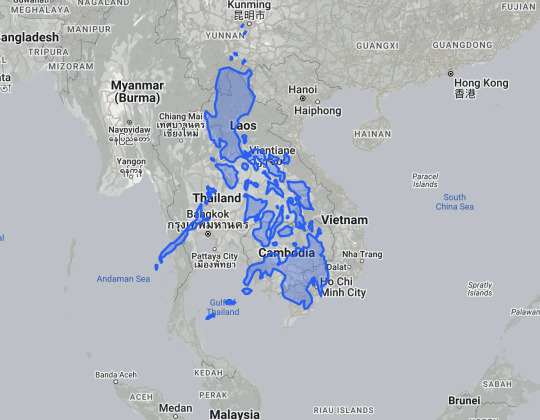
multiple empires can fit within the philippines in size, so that's a fraught argument.
anyway, as i reread fanon i'm realizing too many leftist spaces (at least, mainstream ones in the PH, and especially the manilenyo ones) are currently ascribing to the first kind of culture that fanon spoke about (regurgitation of white culture): looking for pieces of culture to turn into "filipino identity", reinforcing fragments of filipino identity, conveniently forgetting other cultures in the ph (and some even being outright hostile against the idea) when it doesn't benefit their movement (which is annoying, because as real marxists we should be including them under a single revolutionary solidarity). increasingly it's beginning to feel like (manila centric) Mass Organizations are becoming just larger college orgs
however, i'm not saying that won't change--i feel like these orgs will evolve past anyway. and harnessing the power of guilt-ridden petty boojwazee instilled with the fervor of national consciousness is pretty potent in mobilizing large movements, even if they end up burning out by the end of it
so at the end of it i accept filipino as a geographical and revolutionary description, but not as a cultural nationalistic descriptor (as that would end up with us redoing the colonizer's culture). it is a stepping stone. and perhaps we might need to rejigger our definition of the filipino: maybe change its name to pilipinhon (coming from the philippines) from bisaya. or barring that, look at it differently, refuse the colonized intellectual urge to make it a culture like our colonizer's, and accept the culture as it is, of struggle and of liberation.
and then accept that there are multiple cultures underneath it--that there are tagalog cultures and bisaya cultures and lumad cultures and bikolano cultures etc. etc. hell, if the spanish didn't hand us over to the americans, who's to say that the philippines wouldn't have split into multiple different nations (a bisaya nation, a tagalog republic, etc.) it almost happened multiple times in the past. the only thing stopping us was colonialism :)
89 notes
·
View notes
Text
Rant.
it always gives me whiplash when gringos call me or other latinas on radblog "Republican" and "nazis".
Because they are so sure they are making such the point about us being nazis and bringing conservative and apocalyptic takes on them because we don't want men in females spaces, and yet from our perspective, they are still thousands of people all across latam who simply dissapeared when the north american goverment decided to interfiere in latam's politics which lead to real, actual genocides based on politic stance. Specifically being leftist.
My country in particular had one of the most brutal dictatorships in latam. Over 40.000 people were killed, tortured or simply dissapeared just to prevent socialism, despite the socialist president at the time being chosen democatrically.
Now, women, mostly college students feminists at the time were systematically tortured. I'm not talking about internet persecution or some horrible missgender crime. I'm talking of whole brigades raping 14 to 21 year old girls. I'm talking of soldiers setting girls on fire. I'm talking about men open pregnant women to dispatch the baby. I'm talking about torture and murder.
Why? because they dared to talk about politics, because they dared to talk about contraceptives. About feminine issues. For being Left.
It was also a time where the wrong opinion could get you killed, could mean your children being killed. For being brown, for being indio, for being poor. Think of you neighbour accusing you of hearing certain music and your house being raded and your teenage children being taken to a camp to never be seen again. I'm not talking 100 years ago. I'm talking my parents and anyone who is 5 years older than me.
To this day we are extremely affraid of police and the military. The levels of poverty Latam has are hardly something people in first world countries have seen in a years, because the poverty itself has been caused for said countries and their progress. I'm talking whole neighbourhoods of houses made of cardboard while some first world country leaves a bunch of chemical wasteland just right up the corner where we live so they live better.
Two years ago there was a breakout in my country, it was quite famous. You know the first thing the police did?
They raped and hanged a girl on the street. In 2021.
And then comes some random USA/Canadian citizen and calls you "a republican" and "a nazi".
Did I mention after II world war many nazis escaped to latam and formed whole german colonies for either experimenting on humans or create pedophile nets and raping centers? the more you know.
But we are nazis, we are republicans. Despite the fact that that our indigenous people recognize women as adult human females, that indigenous women were hunted down and used historically to be bred by whites colonizers just like them. Despite the fact that most of us are mestizos, that color and class go hand in hand in latam, that we have a culture heavily based on religious intakes of what's women's place and that we shut up when the men talk, because that's macho culture. We are nazis and we are republicans, despite the fact that their fucking country killed thousands of us because we wanted to try left and to hope for something more than extreme poverty. Shit, we've even been called colonizer by some chicano who doesn't even speak spanish. I mean, what are the odds.
But the white men need to speak, the gringo has something to say, they need us to respect their pronouns and go along with their progress. So they packed their bullshit religion and ship it right down the frontera, and now we have to swallow too. Because we are latinas, we live in the backyard, right? what do we know about the experiences of american dudes in skirts.
581 notes
·
View notes
Text
‘It Was Fun to Be Wanted by Someone Like Elvis Presley’: An Interview With Darlene Love
The gifted singer reflects on Elvis’s collaborative presence and his relationship to gospel music
by MICHAEL MUSTO August 7, 2018
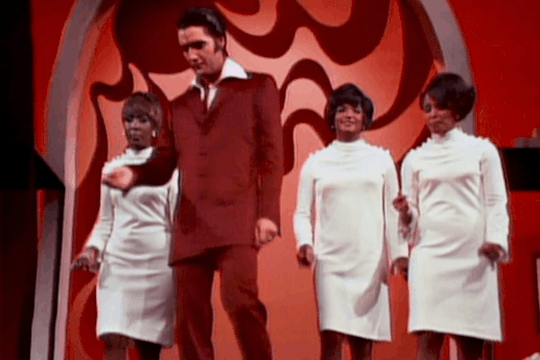

The swaggering real-life Jeff Koons statue named Elvis Presley is hot again. Eugene Jarecki’s June-released documentary The King involves a road trip taken in Elvis’s old Rolls to survey his impact on the culture and determine that the American dream the singer represented is officially dead. (But oh, when it lasted!) Even darker is the film’s exploration of Presley’s appropriation of African-American culture, covering songs like “Hound Dog” — originally a non-hit for the brilliant Big Mama Thornton — and making them rock and sell. For singers like Thornton, the American dream never existed.
Enter powerhouse singer Darlene Love, who is represented on another new project, Where No One Stands Alone, a fourteen-track compilation of Elvis’s gospel work due out August 10 on RCA/Legacy. The L.A.-born minister’s daughter started singing in the church choir at ten, on the road to being scooped up by producer Phil Spector to belt hits like “He’s a Rebel,” “Today I Met The Boy I’m Gonna Marry,” and “Christmas (Baby,Please Come Home).” The lead voice of such groups as the Blossoms and Bob B. Soxx & the Blue Jeans, Love ended up working as a maid in the Eighties, but when she heard one of her old hits on the radio while she was scrubbing, it inspired her to get back into performing full-time. Her appearance in the Oscar-winning 2013 documentary 20 Feet From Stardom was memorable, especially when it addressed the way Spector promised her a solo career, but gave other singers credit for her work.
I recently talked to Darlene about her backup singing for Elvis, and how she feels about the King’s relationship to the music he both co-opted and celebrated.
Hi, Darlene. What is some of the gospel work you did with Elvis?
There is “Let Us Pray,” the one from the movie we did with Elvis, Change of Habit. That was his last film.
It was in 1969, with Elvis as a doctor and Mary Tyler Moore as a nun.
We, the Blossoms, are in the first scene. And we were in his 1968 comeback special [Singer Presents … ELVIS].
His new gospel compilation album should be quite interesting.
They [recently] had me do some fill-ins, what we call ad libs, throughout the album to make it sound more gospel. I haven’t heard it yet. Hopefully it’s a wonderful thing.
Elvis went to church and listened to gospel singers to soak up what they did, right?
Even today, it’s more mixed than it was in the Fifties and Sixties. Whites and blacks didn’t go to church together back then. What Elvis told me he would do — we had night service on Sunday night when we did what we called “praise songs.” A lot of them were songs he loved, what we called “hymn songs.”
We didn’t have air conditioners. We had pushup windows, with a little rope. Elvis said he would stand outside the church rather than going in, because they didn’t think black and white should be in the same churches together. He said he would listen through the windows. It gave him such a thrill. It’s a big difference between the way blacks sang gospel and the way whites sang gospel.
Do you feel he was dedicated to the music or he was just taking it for himself?
I found out years later, when we were doing the comeback special, that his mother’s favorite music was gospel. He would always sing gospel around her. I think if he could have had a big career in gospel music, that’s where he would have been. But you can always make more money off secular hits. Elvis had 10 or 15,000 people come to his shows to see him. Today, they have mega churches that hold 25,000, but back then, you were doing great if you had 500 people.
I bet they have air conditioning now.
Oh, lord, yes. [Laughs] I lived in Texas for five years as a young kid with my father, and it was so hot we couldn’t even breathe. There was no air conditioning in church or the house. What a difference it makes to have a cool ensemble. You still sweat because of the energy, but back then, we were soaking wet, when we sang in church.
I love gospel music. If I had a calling — meaning from the Lord — just to sing gospel, I would have, but the secular music got to more people. I bet a lot of secular singers like Sam Cooke and Aretha Franklin felt the same way. They never paid us no money. “Do it unto the Lord.” “OK.” [Laughs] We would drive to the gigs and they’d give you an offering — gas money. They were hardly giving us a whole lot of money. But it was worth it, every penny of it. It was a wonderful experience singing gospel.
But was Elvis appropriating the music, or that’s just the way it was?
That’s just the way it was. A lot of people think a white person is copying the black person. He just loved the music and he was singing it the way he felt. He sang “Hound Dog” completely different than Mama Thornton. [Elvis’s version was rock, whereas Thornton’s was blues.] Even today, they take secular music and put it in gospel, and vice versa. You know, Elvis won three Grammys, and they were all for gospel records.
What were your experiences like with Elvis?
One time, Elvis decided we’d all go to the movies. He bought this theater out that night.
What did you watch — Change of Habit?
Don’t even ask me. I don’t remember. [Laughs] We had a lot of free time when we were recording and when we were making the movie. That’s when the Blossoms and myself got a chance to know the gospel side of Elvis. He’d want to know the songs we knew. He’d get his guitar and say, “You know this song?” “Yes, we grew up on it.” He’d say, “Let’s do it.”
Was he funny or serious?
He was funny and he was serious sometimes. If he didn’t think he was doing great, he’d say, “Hey, girls, how’m I doing?” He was very, very funny. I call it that “country funny.” He would do his moves in the studio the way he was gonna do them onstage. It made it easy to be around him, but sometimes it was not easy because his bodyguards were keeping people from him. He wanted to be with the Blossoms, where he could pull out his guitar. We’d say, “We think you’d better go. You’re gonna get us in trouble.” We’d never forget, because he’d be giving us his personal time.
You’d just be hanging out and singing?
Yes! Whatever song he knew — “Amazing Grace” or “River of Jordan” or “Heaven Is a Wonderful Place” or “Sweet Hour of Prayer.” We called them hymns of the church. There was another one called “Pass Me Not, O Gentle Savior.” The Blossoms were known for their harmony. We’d harmonize with him. There’s something we had with Elvis that others didn’t have. It was fun to be wanted by someone like Elvis Presley.
He had tremendous respect for you.
Yes, he did. That was great. I always say he left us way too soon. He is where I plan to go one day, so I’ll see him again.
You were all rather young and great-looking. Was there any sexual tension in the air?
There was. It could have been. But I was too scared to do anything.
You fool! [Laughs] Kidding. You wanted to keep it professional.
And I definitely did. Something about dating someone you’re working for, it takes away from that. “I know he’s never gonna look at me the same after this.” [Laughs] He’d start playing with me. He’d tap you on the shoulder or do a hip shake, and me and Elvis knew what that meant.
Flirting?
Yeah, I think so, and I think it showed his human side. I wasn’t bad-looking — and I was thin, too. [Laughs] He wanted to take out time and be around us. The reason we sang on his ’68 comeback special is he was the one that insisted that the Blossoms sing in the music section of the show.
So Elvis treated you better than Phil Spector did?
Oh my God, I’d say so.
That’s an easy one.
That’s a real easy one. Phil took advantage of me and my talent. With Elvis, he wanted us to work, and we got paid well. It wasn’t like Phil Spector cracking the whip and us running around!
59 notes
·
View notes
Text
hi guys its time for me to be obnoxious and loud abt my metalocalypse cultural headcanons eerrg. big infodump & lots of pics under the cut

ok so first of all you cannot convince me murderface is not hispanic&latino . since he has no confirmed ethnic background as well as thick curly hair i drool allll over thsi headcanon its so good. i like to think hes colombian + mexican and grew up in texas.. little texmex baby do you guys get what i mean. like i even wrote about it. i also think he grew up in a very catholic household . stella murderface had That One Wall with all the crosses on it. you know what i mean

ok next up we have the worlds most blatant case of me projecting. already nathan is canonically indigenous south american (""yaneemango"" in the series, though theyre very blatantly meant to be the yanomami, so he's yanomami to me) so hes got that brazilian indigenous realness on his mother's side. but i was like NO I CAN DO MORE! so i liek to think that oscar explosion is french + moroccan. but not just any moroccan i like to think hes AMAZIGH!!! (just like me), specifically riffian :P. so yeah nathan indigenous x2 because i fucking can and its fun to imagine nathan learned a bit of french from his father

ok here comes in more mixed headcanons cause you know my mixed ass cant fucking make any character Not mixed. anyways to me toki is not only norwegian but also greenlandic. spcifically INDIGENOUS!!!! he's inuit + tunumiit :3 why ? Cause errm i can. Deal with it...

oh and heres the Big One. ive always headcanonned charles as wasian also due to his design since he has monolids (which not many people talk about) and a kinda unknown background . so we got some mixed vietnamese + korean realness going on . the danish flag comes from the theory that hes danish because toki puts the danish flag on his little meal in diversityklok and no one in dethklok is danish so it could represent charles cause the flags are meant to represent dethklok. his last name offdensen is also rly similar to the danish Odense. and then i was like.... hey..... since i did the french+moroccan thing with oscar&nathan i can do danish+greenlandic for charles.... so charles also got hit with the inuit beams, specifically kalaallit. Oh and hes jewish to me too.
.
And thats it . skwisgaar is really fucking swedish to me. for pickles also i just call him the irish white boy but i like to think his family is like. celtic irish that later converted to christianity down the line to conform cause Yk how his parents are.
#burger labs.txt#burger labs.png#metalocalypse#burger labs art#long post#headcanons#hcs#charles offdensen#nathan explosion#toki wartooth#william murderface
54 notes
·
View notes
Text
An Early 2000's Child's Observation on Zutara Shipping War.
I awoke from my slumber upon discovering the Avatar fanbase, and the absolute shipping war that I never really gave a shit about until now. Zutara is a relatively new ship to me, as is any other ship that isn’t canon, so I’m gonna run through the list of anti-zutara arguments that I’ve found, and list out my takes on them. I’m doing this, because although I see lots of love for Zutara, there’s some aspects about Katara and Zuko’s relationship in the show that makes me question how well their “chemistry” would actually work. For that, I’m genuinely curious and even politely asking “Zutarians” to please step up and respond with their takes on arguments against Zutara. Though, I should mention that there's going to be some anti-zutara takes that I don't agree with. I'll just be getting them off my chest. Welp, here we go now:
"Zutara can't work because it's Oppressor x Oppressed".
I've seen people saying this, and then saying that you can only "truly" agree/disagree with this point if you're an oppressed ethnicity, class, or whatever. Well, I guess as an African American woman, I honestly think the argument that "Zuko and Katara absolutely cannot work out because he's the colonizer and she's the victim" is rather dumb and blatantly ignores the fact that Zuko was trying to change his ways. Like, that argument is so stupid to me, it's almost offensive. We see Zuko change and try to keep changing his perspective on other nations and foreigners, and the step he takes to do that is by standing up to his father on the day of the eclipse and declaring his new mission to find and help Aang and his friends stop the war. Ozai wasted no time trying to do what he wanted since day 1 of Zuko's life, which was to end him. Zuko put his life on the line to change his ways. If we're going by the logic that Zuko can't be healthy for Katara because he's an oppressor...what the fuck was the point of him trying to gain their trust and trying to help Aang take down his father...if he's an oppressor? If we're going off the logic that Katara should not trust Zuko because he (more like his father and father's army) is an oppressor, shouldn't that apply to the rest of the Gaang as well by the fact that each of their nations and cultures were/are threatened by the Fire Nation? Going off of that logic, it becomes easy to say that Zuko should have never gotten a chance to even be friends with Aang, Sokka, Katara, Toph, and Suki just because his family consists of war-mongering assholes, but why would anyone say that when it's shown that Zuko is actively trying to change his ways at that point? Also, if we're go there (the colonizer stuff), it's almost like saying white people should never be dating any nonwhite solely because many whites in positions of power abuse it to subjugate nonwhites. It blatantly ignores the real-life contexts and instances where individual whites mean no harm and are able to get along with other races. It blatantly ignores the instances of whites being able to find genuine love with people from other races, even in hard times like the Civil Rights Era and various wars. We can see that it's fucked up to generalize...so why do we gotta do that with Zuko? Keep in mind, I'm talking about the point where Zuko is officially redeeming himself.
"It would make no sense for Katara and Zuko to end up together at the end--They only had limited time together".
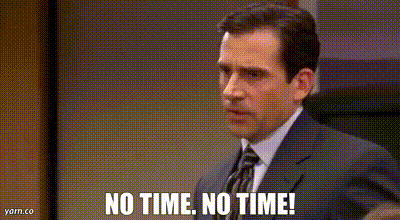
Now this, I definitely agree with. I understand that Zutarians loved the hell out of Zutara and rooted for them to be together at the series finale, but the in-lore time and development Katara had with Aang, and Zuko with Mai is objectively more grounded and overwhelming than all the "evidence" that Zuko would have had a great romance with Katara. Even with Zuko having redeemed a lot about himself in his arc at season 3 and AFTER Katara learns to trust him, there's literally no time for them to develop any romantic feelings or a relationship because Sozin's Comet was just like several days away at that point. Even in the catacombs of Ba Sing Se, Katara's moment with offering to heal Zuko's scar and to really establish a bond was interrupted by Aang and Iroh before she could waste her spirit water on him--THEY HAD NO TIME. Meanwhile, Mai and Zuko were childhood friends, and knew each other for basically their whole lives. Plus, they were dating throughout the series. In practicality, isn't it going to be Mai that would make the most sense as a love interest due to the fact that of all candidates, Mai understands Zuko the most? Isn't it Mai that Zuko has took the time to write a letter for in the prison, smile and laugh for? With Mai, we see Zuko at his most happy. Point is, Mai is objectively a very important love interest to Zuko, so even though they broke up several times before, I don't think Zuko is the type to just throw his tears away and immediately move on. I mean seriously, Jin was more like a rebound fling and Zuko didn't even blink when he dipped back to the Fire Nation. And I don't think I need to pull up the entire show just to list examples of Aang and Katara having each other's backs and developing an unbreakable bond. Zuko and Katara didn't have the time to develop romantic feeling for each other at their best and even if they had an infatuation for one another, wouldn't Zuko's bond and romantic feelings for Mai predictably just bubble to the surface again? I mean Zuko lost no sleep when he basically ditched Jin and went straight back to Mai. No offense to anyone who loves Jin/Zuko, I'm just telling it as it is.
"Zuko does not consistently consider Katara's feelings".
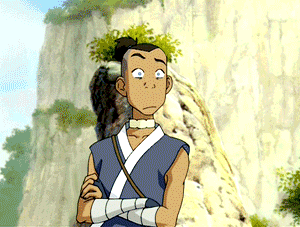
Again, this is true. After returning to the Fire Nation, Zuko isn't shown to be shaken by his betrayal to Katara. He's just not thinking about her during his time back home. But what I definitely want to talk about is the part where he joins the Gaang, and Katara is vocally distrustful of him. This is the aspect of Zuko and Katara's relationship that has always stopped me from actually shipping them together. Katara is vocal, again and again, that she doesn't trust Zuko because of his history with basically being a serious asshole bounty hunter for the avatar, because of him betraying her trust back in Ba Sing Se, and the fact that she personally blamed Zuko for her mother's death due to associating him with Fire Nation scum. Now while Katara is clearly bothered by his presence in the Gaang, Zuko literally didn't care and was on-board to keep on trucking. It's only after it gets too annoying does Zuko now care about Katara's feelings, and what does he lead with? "This is so unfair!". Upon confronting Katara about her feelings, Zuko immediately declaring that Katara was being unfair just reveals that Zuko was thinking more about himself in this moment. That Zuko didn't do anything wrong, that Zuko must not have done anything wrong because Zuko does not even remember what he did to piss off Katara. Katara is the one that has to check him by explaining why she doesn't like him: his betrayal, her perception of his affiliation with the Fire Nation, and PROBABLY the fact that he sent 'sparky sparky boom boom' man after Aang. Right after that, Zuko goes to see Sokka about he and Katara's mother, and while that's very considerate of Zuko...it shows that he's kind of ignorant about properly apologizing for his wrongs. He skipped doing any apology for what happened in Ba Sing Se, and went straight to "Okay, what's the deal with her mom?". It's nice that Zuko gave Katara the option to do a Quentin Tarantino mission on the dude that murked her mom, but the fact that Zuko put Katara's vocal disapproval and Ba Sing Se event kind of on the back burner of his concerns isn't quite a good look. It shows that Zuko, although in redemption, still possessed from listening problems.
Also, when searching for different takes on Zutara, I found a post by a particular user that I don't remember. But basically, in critiquing Zutara the user mentioned Katara threatening Zuko that she would "end his destiny personally" was 'abuse'. I believe this user is called, 'erin-the-brave'. Well in my opinion, that just wasn't an intelligent perspective on Katara's dialogue. In Katara's perspective, Zuko has been chasing her, Sokka, and Aang across the world to capture him, which to her would mean the doom for the world. Zuko taunts Katara about her mother's necklace, using it to try bringing her into giving up Aang. Zuko is randomly living in Ba Sing Se, and right after she has a short bonding moment with him, he immediately choses to help Azula kill Aang. Zuko then sends an assassin after Aang, in which that assassin locks Katara and Toph up in a jail cell as bait. I get that Zuko helped free her dad and Suki from prison, but goddamn, how the fuck else do you expect Katara to react to Zuko's sudden redemption? Even if he IS trying? Katara isn't a fucking mind reader. Like how did you genuinely expect her to react? "Oh you poor thing! Let me welcome you with wide open arms so I can kiss your ass and wipe it with a sample of spirit water"???
"Oh Katara's being abusive to Zuko because she was telling him that she'll end his life if he hurts Aang again, even though Zuko HAS repeatedly tested everybody in the Gaang". Could it serve as an argument that Katara wasn't given much time to learn with, and trust Zuko in order for a romantic relationship to work? I think so. But would I say Katara's reaction to Zuko's second redemption is 'abuse'? No. I think it would be overreacting to even call that verbal abuse, because in Katara's shoes, who wouldn't be wary of Zuko?
"Zuko was pushing Katara to be a murderer in The Southern Raiders, he was bringing out the worst in her".
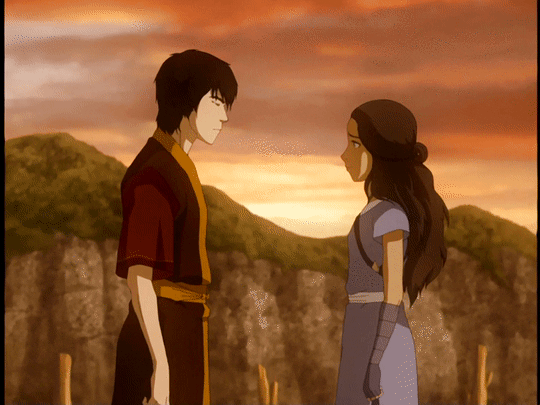
I actually disagree with this. Zuko merely told Katara that he knows the guy who killed her mother, and that would help her find him. If I recall correctly, he didn't push or pressure her into actually killing him. He merely offered her a journey to find the fucker who took her mother's life. Katara contemplating murder, going on the trip, and even blood bending during the mission was 100% her own choice. The fact that Katara almost instantly chose this journey with Zuko seems to imply that this was something she always wanted to do, but just never got the chance for: confronting her mother's killer. Even after Katara chose not to kill the guy, Zuko didn't hold her choice against her. He doesn't belittle her, nor did he ever pressure her to twist Yon Rha to death like a pretzel. Zuko actually tells Katara that her ability to be better than Yon Rha was a person strength, and Zuko even seems proud of her in that moment. He gave Katara the chance for closure, she took it, she tackled the confrontation in her own way as Zuko let her have her spotlight, and they walked away with him being proud of her.
"Zutara would be better if you just replaced Zuko with Azula in the ship".
This is a joke, right? Because the only way this could get funnier is if you threw in Ozai.
"a fic which does 'ATLA’s plot goes almost exactly as canon, except my favorite ship happens' is not clever or innovative".

....it's fanfiction with endless creativity, writing styles, and brains behind it. Rewriting the show's beginning, midsection, endgame, or all of the above is objectively creative and at least a little innovative. Fanfiction absolutely can be creative and innovative, you don't have to lie just because you don't like a ship, my brother.
"Katara offering to heal Zuko's scar is actually evidence that she does NOT fully understand Zuko"

I've seen this take and I think it's one of the best arguments against Zutara, to be honest. A user named 'Maikingsenseofit' explained it so well, I'm just gonna copy and paste it:
"Upon seeing his scar, her immediate thought is to use spirit water to heal it. While this is an outstanding demonstration of kindness for someone she is not obliged to show it to, let’s remember that right before this Zuko says:
“It's okay. I used to think this scar marked me. The mark of the banished prince, cursed to chase the Avatar forever. But lately... I've realized that I'm free to determine my own destiny, even if I'll never be free of my mark.”
This. Right here. It is so important to understand. Zuko’s scar is so much more than a scar. It represents his trauma from his father, the trials and tribulations he faced to earn Ozai’s approval, and is a further reminder that he is the black sheep of the family both figuratively (a son who could never live up to his title, who could never bend like he was supposed to) and literally (the only member of a pristine royal family with an ugly brand on his face).
But his journey with Uncle Iroh in Ba Sing Se allows him to come to terms this trauma, or moreover this scar. It’s a reminder that we cannot escape our past or try to stifle it. We must embrace it and learn to accept it. It is only then that we are fully liberated from the shackles of our trauma and can fully determine our paths forward.
Katara’s offer to get rid of Zuko’s scar represents a regression of Zuko’s hard earned realization. He had just come to terms with his troubled past and accepts the ephemeral mark on his face. He even wears it with pride. He doesn’t try to hide his past or stifle his trauma, not anymore. It is an integral part of who he is. It is what makes Zuko, Zuko.He vocalizes this to Katara immediately before this. Katara however, fails to understand the significance and the journey behind this mark, largely in part because she wasn’t there to witness it. Her attempt to heal his scar falls flat in several ways, but one main reason is because just because something is healed physically, doesn’t mean it’s healed emotionally. But it’s important to consider something else here: Zuko never explicitly asks Katara or verbalizes a desire to get rid of his scar. Based on the earlier conversation, he’s finally gotten around to embracing it and welcoming the significance behind it. What Katara offers is in stark contrast to what he said. He allows her to touch his scar, but it is evident that she would never heal it. Why?
From Belen Edwards, despite the traumatic memories associated with his scar, Zuko never seems particularly ashamed of it. Throughout season 1, his hairstyle ensures that it's completely exposed, showing his identity to the world. In the second season, Zuko tells Katara that he's beginning to accept that he won't be rid of the scar.
And yet despite hearing the last part, Katara still offers a solution to Zuko to get rid of it.
This is where we see that the so called deep understanding and caring that Zuko and Katara held for each other is beginning to crack. Where is Katara’s deep and profound, soul-ular (get it, like cellular?) understanding of Zuko that no one else, other than Iroh, had of him? It begs us to ask if Iroh was in that room, given the journey he embarked on with his nephew both physically and emotionally, would he have encouraged Katara to get rid of this mark? The answer is obviously no. If there is a deep vulnerability and intimacy that they share with each other, and no one else, it does seem pointless given on both ends neither understands the full depth of the other’s situation. This is exemplified by Zuko immediately forgetting his entire interaction with Katara (but not His interaction with Aang interestingly) afterwards and still failing to understand why Katara was mad at him, even AFTER she explicitly tells him. And this is exemplified by Katara not fully acknowledging and understanding Zuko’s acceptance of his scar and offering a surface level solution that will never address the emotional significance and tribulations that come with it. Nothing against either of the characters by the way, and I need to emphasize that in bold font. I am simply observing their interactions and dispelling these “Word of God”-like claims.
Consider Zuko’s interactions with Mai. When he first sees her after years of banishment she gently his scar and touches in it not in an attempt to get rid of it, but because it is a part of Zuko. And when it comes to kissing Zuko, it means touching his scar, touching him in his entirety- including his physical and emotional marks. There’s a deliberate reason why the storyboard artists included Zuko’s scar in the scene. Because she’s known Zuko her whole life and was there when he first received it. Zuko and his scar are not two separate entities for her. They are one and the same"
End dialogue.
What should be mentioned is that Zutarians do like to say that "Katara is the first person to ever touch his scar"...which to be honest, I just don't believe. I just don't believe that Katara got to touch his scar before Iroh or Mai ever did, because it would insinuate that Iroh and Mai have never caressed the side of Zuko's face to comfort him, and after all those years of being close with them. Then there's the claim that Katara is the only person Zuko opens up to in the Gaang, even though he talked about some of his feelings to Toph, talked about some of his feelings to Sokka, and talked about some of his feelings to Aang. When Zuko snatched Aang and hustled themselves into a cave in the middle of blizzard nowhere, Zuko opens up about his rough childhood to Aang. Yes, Aang wasn't conscious to listen, but Zuko DID talk to him. Perhaps Katara is the first member of the Gaang that Zuko opened up to (the "mom talk" in Ba Sing Se) without the other person being too out-of-conscious to listen, but she's definitely not the only one that Zuko opened up to. She's technically not the first person to give Zuko a chance, but Aang was the one who did it right after he was freed by Zuko (who was disguised as the Blue Spirit).
"Toko = Zutara = Zukka = just about any fan pairing/OT100 involving Zuko".

I don't entirely agree with this. For context, a user by the name of 'atla-recluse' posted this in regard to Zuko shipping:
"Toph, who actually wanted to go on one just to hang out with him. Toph, who tried to speak to him about her personal struggles (as they walked together in search of Aang). The sort of thing an actually compassionate and reflective boy would have at least tried to sympathize with, even if only briefly. Instead, he immediately shuts her down. Seems he didn’t have a second to waste on some dumb little girl, right? This same girl who would later on take moments out of her time to sit down with him and comfort him (The Ember Island Players). Someone’s always there when he wants support. An emotionally volatile 12 - 13 year-old comforting an even more emotionally volatile 16 - 17 year-old. Not a good look. And yet…Toko = Zutara = Zukka = just about any fan pairing/OT100 involving Zuko. And the reasons why they’re shipped always seem to be the same, save one little difference here and there. It’s always about pleasing Zuko and his you-know-what. Pardon the innuendo and my mood."
I agree that Zuko was kind of a jerk to Toph with how he dismissed her, even though he dumped his emotions out and let her give some reassurance. Zuko went on a journey to free Hadoka from prison with Sokka, and Zuko went on a journey to give Katara closure for the fucker that murdered her mother. Although Zuko has streaks of selfishness in his good deeds, it should still be noted that he does care enough about Sokka and Katara to help them in regard to their families. Meanwhile, Zuko factually never even said Toph's name during the entire show's runtime. I'm not saying that Zutara is a perfect ship, but I am saying that it IS different than Toko.
The Final Point to mention: They just ain't into each other".
And although I like checking out Zutara fics and seeing what creative combinations the Zutarans had to bring for over ten years, I still don't truly ship Katara and Zuko because they're just not into each other. Look at the Ember Island play scene that depicted Katara and Zuko being secret lovers in an affair. They literally cringed away from each other. They didn't blush or smile, they CRINGED.
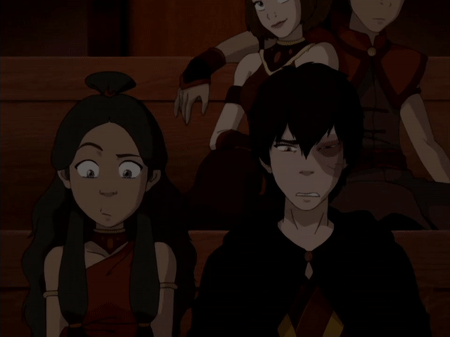
So far, those are my takes on this apparent "war" with the Zutara shipping. So here's where I casually call up hardcore Zutarans to ask a genuine and polite question: what is your response to these arguments against Zutara? Will you still ship them after these arguments? I would really like to know your perspectives, and to see if my mind can change. I don't hate Zutara, though I'm not sure if I ship Zuko and Katara either. Again, that's my actual take, and I would super like to read what Zutarans would like to say about all this.
#zutara#pro zutara#anti zutara#shipping wars#avatar the last airbender#atla#analysis#debate#katara#prince zuko#zuko#the gaang#atla gaang#argument
46 notes
·
View notes
Note
holy SHIT the dsmp real world example i. sorry idk if you like people reblogging your posts with massive additions so this is an ask.
l'manburg realistically would be a city-state since it's not big enough to be a full city, with the populace in about something the size of the Vatican (~5000-10000 people) supplied by fields and the river, which is the main source of their trade. like the new england colonies, they would have relied on water to send exports to other countries and traded with greater DSMP citizens. additionally, hewing to the new england 1770 vibe (which is p funny because of the hamilton jokes) they'd be shipmakers and craftspeople.
this also means that the dteam burning the redwood fields would have devastated their economy for at least a few years; additionally, as it's a walled city, siege tactics would have been very effective and probably devastating in terms of famine and disease if the l'manburgians could not keep river access open.
on politics - ik cc!wilbur talked about c!wilbur running the whole government but that is. impractical and also poor governance, since concentrating all power in one executive leads to a lack of accountability and transparency. ofc we didn't get to see this but i imagine c!wilbur had a cabinet of actual people running things but probably took on a Lot of engagements. if we're working with "the dteam caused an ecological catastrophe", newly independent l'manburg would have needed to import food until its reserves stabilized again. this, combined with its newness and very aggressive neighbor next door, would mean local prices skyrocket and food is. fairly expensive. if the l'manburgians had their own currency it would trade at rock bottom prices against the DSMP coin, even if c!wilbur pegged it to gold/silver. he'd probably make it fiat to stimulate the economy (assuming he Knows about the economy) which would skyrocket inflation. tl;dr l'manburg is in pretty shit shape and would be a Lot of work to get up and running.
on manburg - the coalition is unconstitutional but we're playing fast and loose with constitutionality anyway; i feel like c!quackity's candidacy would have appealed to the subset of l'manburg business interests who may have wanted freer borders and freer trade + lowering interest rates that protect domestic industry but raise prices. (early american economic policies were heavily protectionist and had high tariffs to protect the young industries as well). c!wilbur could have hit against this by calling c!quackity out of touch with the common citizen (which he was) and a carpetbagger (which he was). however, there are some legit claims of corruption that c!quackity could've made and framed himself as the young upstart clean changemaker - after all, c!wilbur was not open about the presidency.
however, c!schlatt's presidency would have been marred by suspicion and protests early on; if there were civil servants working in the white house, i can picture a bunch of them resigning in protest and writing Very Angry Op-Eds in l'manburg new york times about it. income inequality prob spikes as industrialists can trade but the cost of living jumps due to mismanagement and the manburg cabinet needs to deal with threats of terrorism (pogtopia). what's super interesting to explore is the journalism of l'manburg?
like l'manburg def had a very busy and thriving political commentary and journalism culture; c!wilbur is a wordsmith, etc. there's definitely some scathing cartoons and 'anonymous' pieces attacking all sides during the election, with increasingly bitter skits written about the manburg cabinet - schlatt, the insensate and alcoholic tyrant, and quackity, his airheaded and venal henchman. if schlatt and quackity's marriage leaked, there's a Lot of slut-shaming jokes directed at quackity, which p follow him into new l'manburg. slept his way to the top, has more experiencing bending over the resolute desk than sitting behind it.
ANYWAY that's all i have for now? this is such an interesting idea i would kill to talk about it more holy shit. l'manburg politics win
YEAHH YEAAAAAAAHH all of this i love it so much. politics and socioeconomics and how it intersects with the actions of wilbur schlatt quackity dteam everyone.... aaaaah
170 notes
·
View notes
Text
So, I'm filling out my mail in ballot and like... Lately I've been getting hit with the cultural differences between myself and others.
So, I'd like to talk about how that may impact how I view Milgram.
It's no secret that I'm African American. Yet, there's a great deal of people that will have assumptions on what that means, how it looks, what I must be into outside of Milgram etc. These things as we've come to know quite well through Milgram, are biases.
As we've discussed before biases aren't inherently bad. Biases in and off themselves are ideas we pick up about society based on our personal experiences. They're like a quick cheat sheet that no one can help but make in their head.
For example- Since I said I was African American. One could assume things about my,
Skin tone
Education
Social Status
Simply based on that knowledge alone. One could assume that I'm dark skinned. An assumption that a good deal of people make when that term is used despite the various skin tones throughout the African American community.
If I were to then respond to that assumption with,
"Actually I'm light skinned." (This is a fact and a example.)
Another assumption would come into play.
"Oh what are you mixed with?"
This would lead to two answers. Nothing, literally everyone in my family is black. Or, "Wow; can you take an educated guess? I did just say I'm African American is there any historical context you could possibly gleam without asking me why my skin tone is what it is. Anything, is there anything coming to mind that may explain? Might rhyme with armory. Might involve a word that sounds like shave?"
Nope damn...the answers still nothing just African American or well if we discuss the history of slavery real quick we get this very complicated non-answer of too many things to count. Including white and Native American. Yet if you ask my dad what they put on his papers when he fought in the war they put negro. Because those other two things matter relatively less than the whole black thing.
So, most of my family history is black and I was raised in the black community. Didn't really stop me from getting that question a lot growing up. Mostly from people within said community. These are the sort of biases I believe are pretty common in most cultures. People will judge others based on how they look and assume things about their background.
This is highlighted in Milgram through Mu. It's brought up multiple times that Mu has been othered because of how she looks. Because she does not look typically Japanese, she looks foreign. She has honey-blonde hair and light grey eyes.

She mentions in a minigram that she doesn't like how rain makes her hair stick up.
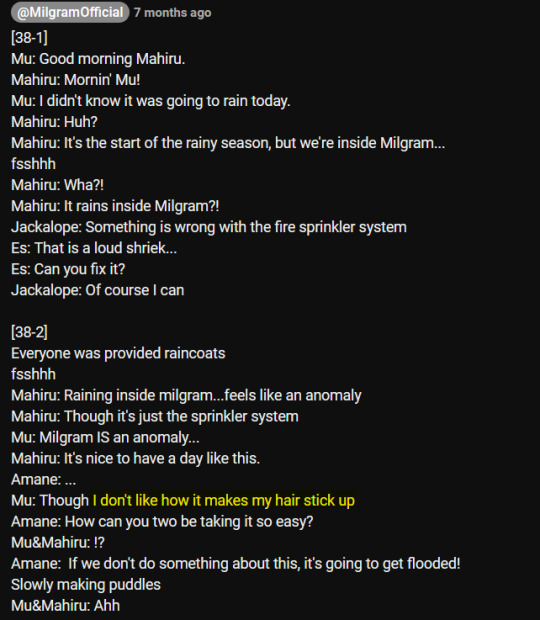
People headcanoning Mu's victim as half black when France has the highest black population out of Europe wild.

X X
Hmmm, wonder why that headcanon hasn't been put on her ahn who knows.
Basically, noting that humidity and water makes her hair frizzy. Probably playing a bit into the reason she doesn't portray herself as being soaked in After Pain. Because she finds this aspect of herself to be embarrassing.
This also could subtly imply that she may straighten or style her hair. Outside of that Milgram highlights how different she looks before the series even starts properly. Noting it in her character description on the website.
A beautiful prisoner with overt features that set her apart from other Japanese people. Despite her slender frame, she’s very candid, and the type to rebel against the abnormal circumstances Milgram has presented her. Due to her nature, she will be very wary of Es at first.
The way she conducts herself gives a sense of her upbringing. Leading us to speculate that she was probably born into a wealthy family. Perhaps, being born into wealth is why she has such a sense of pride, bursts into tears when clashing with others, and is prone to whining.
My sorry spells must be wearing off./I am always the drama queen.
x
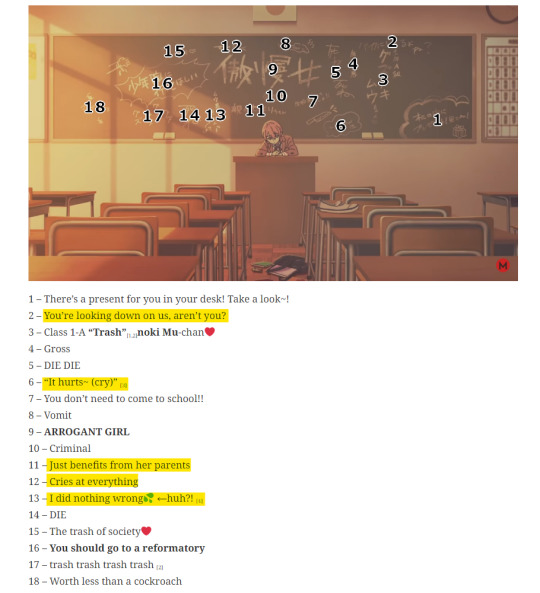
Why won’t you stop hurting me? My heart is all dried up. My sorry spells must be wearing off. But I guess some of it is my fault./ It’s not my fault. I told you I’m queen, and it will never be changed. I’ve got EVERYTHING, everything is as I wish.
And even having it called to attention in the portal timeline.
20/05/31
Mu: Hey, Mikoto-kun, aren’t you scared of this place……? You can’t think of any reason you ended up here, right……?
Mikoto: Ahh, yeah. Of course, it’s not like I’m not scared at all. But just between you and me…… I still haven’t dropped the thought that this could all just be a TV show. I mean, I really haven’t ever murdered anyone. ……and if that is the case, we’re definitely being monitored. For like a prank setup or something. Wouldn’t it be super uncool and embarrassing to get angry or lash and have it shown on prime time?
Mu: Is that what you think……? A prank, huh…… I hope that’s all it is……
Mikoto: Ah! If that is the case, then you’ll probably be super popular since you’re so cute, Mucchan! There’s a lot of girls out there who make their big break coming off reality shows like that!
Like the fact that Milgram lays all of this out from the beginning along with the way it follows through on it is really good. Because it isn't just building as it goes or adding pockets of tidbits of character information on as the trials progress. It's all been there and still is there rewarding people for going back and looking, if they feel like it.
Through bringing to the forefront how different Mu is from those around her Milgram subtly highlights another form of discrimination in Japan. Racism.
Then it does this really interesting thing when it comes to her core friend group in particular.

Milgram makes a point of having all of Mu's close friends be individuals who for one reason or another would not be considered to look stereotypically Japanese. Milgram manages to do this without even giving Mu's friends faces.
Even highlighting in their insect forms through giving them different hair colors from the rest.

Just like Mu herself.
Q.11 Who do you want to see right now?
Mu: I miss my friends too but most of all, Papa and Mama.
In her second voice drama Mu says,
...Warden-san. I think you're really doing something bad. Isn't it a bad thing to act like there has to be something wrong with someone for them to get bullied?
Oh?
No matter the circumstances, it's always the bullies who are in the wrong! Isn't that obvious? Warden-san you're so smart but you didn't even know something like that? maybe you should take some lessons on morals or something.
...
Besides even if I've done something wrong, there's nothing that can justify bullying. Warden-san I thought you were nicer than this.
Not one thing that can justify it not even others doing something wrong. Meanwhile Mu's first trial character voice line,
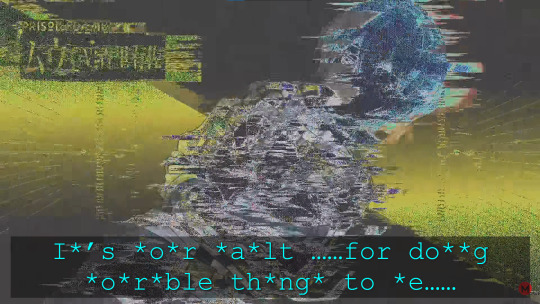
It's your fault....for doing horrible things to me...
Mu goes on to say this in response to Es asking why does she think she was bullied after that,
"How would I know? I mean I'm from a rich family, and I'm an eye-catcher too... It was probably out of some kind of envy or prejudice, right?"
Plus, Mu's stance on bullying quickly changes when it's brought to her attention that Es believes she may have been a bully before she bullied. As she states,
"Leaving behind all that stuff you said about me possibly having been a bully myself- not that any of that's true of course!"
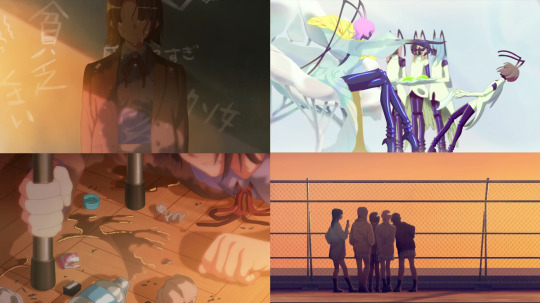
Sorry it was an easy shot.
Can you believe she said this right before this mv came out? Wild. Prisoners stay lying in their voice dramas. Never incriminate yourselves, always lie to authority figures. Double down on the lies if you need to. No one owes honesty to individuals or systems putting them in terrible predicaments.
Lie like you and honesty had a falling out. Lie like being honest betrayed you worse than it did Kazui. Keep lying. Honesty sorry that's a luxury I can't afford right now. I'm in my lying arc trust me at your own expense.
Be Mikoto trial two and gaslight the audience into believing that everything Milgram uncovered was actually a dream trial three. It will work better than you think Mu.

Like naw be more dishonest actually. The realest thing all the prisoners have ever done was just blatantly lie and not back down from said lies. They're all like fucking prove it go on prove it! What do you have mystical songs where I go I did that shit and I'll do it again?! That's not substantial enough evidence.
That could have been an over-exaggeration done to better highlight my artistic vision- Fuck you and your song extractor bring in some actual proof or piss off. This machine was provided by your facility how do you know it's providing accurate unbiased information. The facility had already deemed us guilty of something on incarceration this isn't fair or trustworthy.
Meanwhile if they're innocent what a great and interesting machine you have here.
Sure.
So, if I'd gotten payback for how my bullies treated me then that'd count as revenge right? And if you believe that was my only option then don't you have to forgive me?
...Uh...I'm not really sure what you're trying to say?
You see~ If you think that me bullying someone back after being bullied is the natural course of action, then wouldn't it be bad to bully me back in return?
...
"But if you were like. "I won't forgive you Mu revenge is bad!" Then wouldn't that imply that it's also bad for me to bully someone back after they bullied me?"
I think I'm kinda...starting to get your point...maybe.
Warden-san are you maybe not all that smart after all?
Since the way Mu talks is rather quick and confusing purposely Es has difficulties understanding what she's saying. Despite the fact that she is just reiterating that since she's already been forgiven it would be best if Es kept to that verdict. Because Es has already set the precedent that killing out of revenge or in response to a slight is forgivable. Changing her verdict now won't change that precedent.
Meaning Mu has every intention to bully someone for bullying her again if necessary because Es has stated that the appropriate response to being picked on is picking on that person back. In a way Mu is saying that's what trial one cemented that treating people who have caused direct harm to your or others is completely okay actually.
So, it's best not to start problems for others others at all. So, if Es wants to change their verdict and pick on Mu now that would be no different than what happened to her.
This isn't even a veiled threat. Because she's just saying since you've realized that bullying is the appropriate response to bullying then you shouldn't pick on me because the obvious response would be me picking on you and you don't want that right? Or,
"If you want to betray from jealousy. I’ve told you what’s gonna happen."
The thing is the way I view Mu's story is subjectively changed based on my experiences as and African-American.
When I view her story I don't see the simple one of bullying. I see a story about prejudice and the othering of mixed and biracial individuals in Japan. How the mistreatment these individuals face when younger can lead to them bullying others later in life.
The fact that kids like that are often exposed to discriminatory treatment from a young age by peers and adults due to their overt physical differences. Something that can lead to a great deal of bitterness and self-loathing. Even internalized othering.
Q.08 Which of the other prisoners is most like you?
Mu: I don’t think there’s anyone? They’re all weirdos.
This can be done to make oneself feel less than others or to cope and convince oneself that they are more special than those around them and everyone is just jealous actually. Mu falls into the later category. However, the later category is commonly used in response to discrimination of some sort.
Because it's easier and healthier to respond to others making fun of ones immutable traits such as physical characteristics by going they're just jealous. The other option is attempting to changing how you look entirely which for a lot of people won't work anyway. From that angle it's no suprise that in high school Mu would start doing something that may just have been done to her for much longer by girls who probably resembled those who picked on her a great deal or were people who used to pick on her.
Q.02 What scares you most?
Mu: Painful things, scary things. Also embarrassing things.
Q.07 What is your favourite place?
Mu: Mama’s hometown of Nice. The sea there is beautiful.
As someone who grew up in the states a pretty diverse country. Well Mu saying things like her favorite place is her mothers hometown has a different ring to it. Because in Nice the way Mu looks wouldn't be considered odd or draw attention. Whereas in the place she grew up she can easily tell that the way she looks gets her both positive and negative attention.
I've said this before and I'll say it again the fact that Mu stands out due to her mixed ethnicity is just as a part of her story as being a bully is. The fact that she surrounds herself with people who are similar to her (seemingly mixed as well).
Well it really puts this spin on her story. Not just making it as simple as bullying it but turning it into this story of long term accepted bullying and what that cycle can lead to. If Mu was bullied and treated as different because of her looks and families wealth at a young age. Then she gets into this high school with other people with those experiences. It wouldn't be farfetched for her to want to use the opportunity to get revenge on the people who treated her poorly before and take advantage of the system that allowed it.
In order to lessen the impact of the idea of her being a bully which she denies as ever being true she states it would be fine for her to be one under Milgram's logic if it was in response to being bullied in the first place. That it's fine as long as it's revenge. A mindset many victims of bullying who become bullies later have. That it's fine to do because no one said it was wrong when it was happening to them. It's okay if they do it because if they do then it can't happen to them.
This especially puts an interesting spin on her first cover song and trial song.
Especially these lines,
Otome Dissection
There's been a lot of analysis of this song for a long while. For now, I want to analyze it from the angle of the singer dissecting themselves. An angle that the song has been taken from before. Given the visuals in the mv near the end.
The more overt ones.
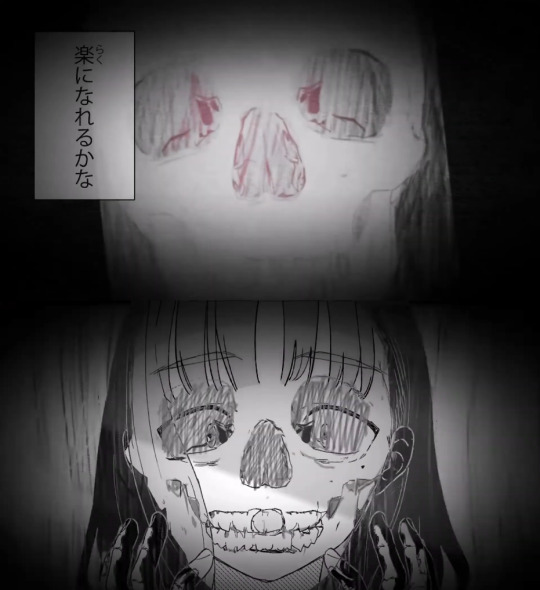

Along with when the signer is shown pretending to call someone and closing their own body bag.
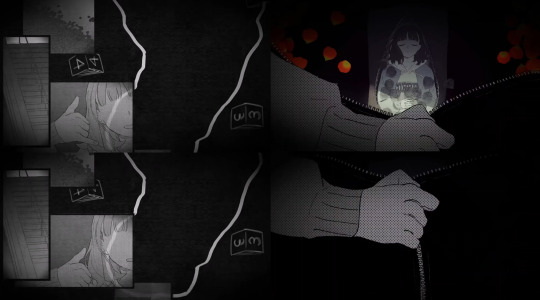
All after the line "Let's see if our climax had been a let down. Ever since that night."
Now if we phrase Otome Dissection as the singer singing to themselves that would make it more interesting in the context of Mu's case and the way it can relate to ethnicity. Because I think Otome Disssection manages to perfectly encapsulate the feeling of self-loathing, dejection, and hopelessness that being a minority can make a person.
The song highlighting how the singer has found something that makes them feel good as long as it hurts. Something that's validating and invalidating all at once. A way a lot of people feel about exploring or expressing their culture/ethnicity in a place where it's marginalized or stereotyped in some way. The feeling can be just as isolating as it is liberating simply because at times even when people want to do this there's not much community around them locally.
Plus, taking an interest in it won't make discrimination stop. At the end of the day people are still going to put you on a pedestal or hate you because of how you look. Though it can still be fulfilling. Also highlighting how one will dissect themselves, cutting themselves down to be more acceptable in an environment that didn't want to accept them to begin with. Again, going back to how it only feels good when it hurts.
They only get acceptances when they're burying parts of themselves. Yet, still desiring to be loved for everything they are the good and the bad and trying to convince themselves that they love who they are despite everything around them making it feel as though it'd be better,
If I had just disappeared.
All that self-loathing and disdain turns into boisterous self-confidence. Because it's feels like the only way that person can survive. Yet they still need this constant outwards validation because they don't know if they're allowed to be here. Even though they feel like they should be it doesn't feel like they are.
I want to feel “alive”, is it ok if I breathe? Tell me./I wanna feel shame, ever since the night when I realized it's good as long as it hurts.
Yet no amount of validation is enough because the person can't validate themselves. They're always going to be afraid of being found out then hated or the other person finding someone else.
Hey, what if If I am a bad girl- Don’t hate me./I actually had a dream you fell in love with someone else. Please tell me it's not true. Come on love me please?
A problem many people who have faced racial discrimination in their environments have is believing that others can like them. Because sometimes from birth all those people are given are reasons why others wouldn't. A list of things that make them odd or different from their peers. So, it's easy to understand why it would be difficult to believe.
After Pain
"I don’t want tomorrow to come. I want to forget yesterday I was miserable, someone please help me."
"If it’s endurance, I’m used to it. It’s just having another taste of it."
When it comes to Futa we see him become the victim of what he dished out after in Bring It On. Lamenting if both sides are losers in Backdraft. Yet, Mu tries her best to hide all the things that hurt and embarrass her. The source of her pain.
Because she doesn't want people to look at it. She doesn't want to replay it. Just like her second cover song further highlights along with her second trial mv.
She even states in the second written interrogation,
Q.01 What were you like as a child?
Mu: I think I was pretty normal. I had a lot of friends, and learned a lot.
Yet she also states that she gets walked up to by modelling scouts on the streets because of her looks.
Q.15 What’s your dream for the future?
Mu: A model, maybe. I’ve been turning down scouts while I’m still in high school though.
Definitely sounds easy to have a normal childhood with stuff like that occurring.
It's easy to write off Mu as not going through that much and just being a spoiled brat and a bully. However, I feel like that would be ignoring some very compelling parts of her character. Plus, she's not the only prisoners for Milgram to allude to dealing with forms of discrimination.
Plus, it is kind of strange that she would jump from having her friends bully people for her to murder. Like that isn't a very natural progression. Now she could be lying about not doing any of that stuff herself like dumping water on people or beating them up. However the only time we see her actually harassing a student is when they appear to be shaking them down and none of that stuff is occurring.
Then she's only alluded to being around in After Pain after her friends do that stuff. So, I genuinely doubt she was being dishonest about that. None of these feelings on Mu I stated here are new. I always appreciated how her story subtly deals with the ethnicity. I like how it shows a victim of bullying become a bully.
I like that it highlights how cycles of harassment begin. I love how Mu's first inclination is to frame herself as a victim of bullying in this situation because on some level she really thinks this is revenge for all the mean things others may have done to her. I also like that she's unapologetic about it. Plus my own complicated relationship with stuff like that makes me sympathetic to her a bit.
Even still it's Mu we're talking about she's not one to be knocked down and stay down. That's simply just another aspect to look at her under and it's one of the ones I find the most interesting given how I grew up.
I feel like that may just be one of the many things that may go overlooked based on how one grew up. Even though Milgram highlights it in a lot of ways.
Another one that may go over some's head is poverty in general given the cases of Amane and Mikoto. Like people not really understanding why he's so focused on his job or why Amane's family lives where they live etc. It's just interesting how Milgram tries to represent varying demographics. Like there's a plethora of other examples but I've gone over them before.
At least I find it interesting.
38 notes
·
View notes